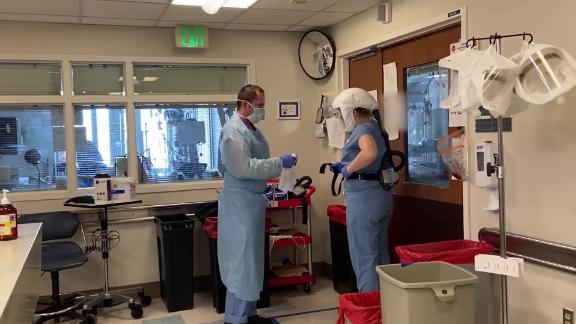New Covid-19 crisis hits ICUs as more patients need dialysis

Emergency room doctors say they are running into a new crisis as they struggle to treat patients with Covid-19 — a shortage of dialysis machines and supplies.
They say they are overwhelmed, not only because patients are going into kidney failure, but also because the body’s intense reaction to the virus is often causing their blood to clot too much, and the clots are literally clogging up the dialysis filters.
It’s part of the new syndrome that doctors are seeing in Covid-19 patients. They are not dying from the pneumonia that has been one of the defining symptoms of serious Covid-19 disease, but from other systemic effects on their hearts and other organs.
“It’s taken everyone by surprise because it is acting so different from everything else,” said Dr. Sam Parnia, a critical care specialist at New York University Langone Medical Center.
“They are not dying because they can’t get enough oxygen. They are actually dying because of other complications and it is predominately due to blood clots.”
And these blood clots are clogging up the filters used to clean the blood during dialysis, Parnia and other doctors told CNN. Intensive care units are already struggling to get enough dialysis equipment and staff to care for Covid-19 patients and the crisis is made worse because they go through so many supplies.
“There aren’t enough filters,” Parnia told CNN.
Clots clogging filters
Dr. Enrique Lopez, a surgical intensive care specialist at Phoebe Putney Health System in Albany, Georgia, says he is seeing the same thing.
“Their blood does not clot appropriately. It’s overclotting,” Lopez told CNN. “When we put patients on dialysis, they have a tendency to clot the filters.”
The clotting is likely caused by what’s known as a cytokine storm — an intense response of the immune system to an infection. Some patients with Covid-19 are experiencing this overreaction, and one result is blood clots in the lungs, liver, kidneys and possibly the brain and heart, also, doctors are saying.
“When people are reporting on autopsy results, they are seeing clots everywhere in the body,” Parnia said. He said he suspected the blood clots are damaging the kidneys.
Dr. David Charytan, who heads nephrology at NYU Langone Health, said there’s also evidence the virus is directly attacking the kidneys.
The result is a much larger need for dialysis than normal in ICUs already filled to overflowing with Covid-19 patients, Charytan said.
“One day last week, we had 186 patients intubated with Covid,” he said. That means they were attached to ventilators to help them breathe. Normally, he added, about 10% of ICU patients would need dialysis. “We’re seeing 20% to 30% needing dialysis,” Charytan said.
And the ICU is normally equipped to handle 118 patients, so 186 patients means a more than 50 % overload.
“It’s been a real struggle,” Charytan added.
Lopez said it means making hard choices. “You have to try to decide who’s going to get dialysis and who’s not,” he said.
Some doctors have tried using blood thinners such as heparin to try to reduce the clotting, but there’s not enough evidence to show whether such treatment helps patients survive.
“We are trying whatever we can,” Lopez added.
Need for dialysis supplies
And they are struggling to get the equipment and staff they need.
It’s especially difficult to deliver what’s known as continuous renal replacement therapy or CRRT — a low, 24-hour-a-day method of dialysis used in the ICU to avoid stressing the hearts of fragile patients.
Last week, Dr. Jai Radhakrishnan, a Columbia University professor of medicine, went on social media to beg for help. “Dire straits in NYC!! Shortage of dialysis nurses, CRRT machines and fluids across all hospitals,” he tweeted.
“A month ago everyone, simply thought this was an issue with ventilators,” Parnia said. Public health experts warned that the US lacked enough ventilators to treat the number of patients who would need them, and companies such as General Motors switched their production lines to making ventilator equipment. GM said Friday it was delivering the first batch ventilators made in partnership with Ventec Life Systems in Kokomo, Indiana, to hospitals in the Chicago area.
But ventilators may no longer be the main need, the ICU specialists said.
“We are not going to run out of ventilators. We are going to run out of supplies for the 30% of patients who need dialysis,” Charytan said.
Parnia added: “Right now, dialysis is the key thing that’s needed. I don’t know why they call it Covid pneumonia. They could just as easily call it renal (kidney) failure with pneumonia.”
